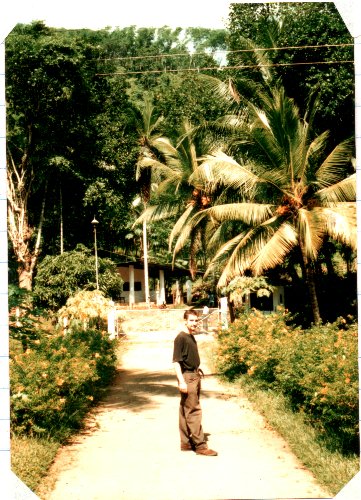Community Report - Conclusions & Reflections
The reason I originally wanted to spend a year in a developing country in-between school and university was to further my understanding of the economics of development and 'third world' politics. However, whilst I did make many observations about the economic and political situation in Sri Lanka, this was certainly not the focus of my year abroad.
It was clear that although the main factors influencing the economic and political climate of an industrialised nation such as Britain (e.g. taxes, inflation, economic growth etc..) still apply in developing countries, the nature of the political and economic system in a country such as Sri Lanka is such that the whole picture has to be considered in a different way. This is not a social sciences essay, so I shalln't dwell on this, but a clear example is how much more important, in a political sense, religion is in countries such as Sri Lanka. Simple economic indicators also have to be considered differently; the nature of the rural areas of Sri Lanka is such that an accurate(ish) measure of inflation such as the UK's Retail Price Index is impractical. A price index is kept for Colombo, but we found prices in Colombo seldom reflected those in rural areas - particularly of such important commodities as coconuts.
There are many aspects of Third World political economy which struck me during my time in Sri Lanka. However, perhaps the most important thing I will take with me into my studies at University is some idea that developing countries, and the entire third world, are not simply models written about in social sciences books, but are places where millions of people live, who are - despite obvious differences - essentially the same as those of us born in industrialised nations.
As I said, however, these observations were far from the main thing I think I got out of my year in Sri Lanka. For me, the most rewarding thing must have been becoming so immersed in such a different culture. At first, as I have written, Sri Lanka seemed like a very strange place to me. But, by the end of the year we felt completely at home in Sri Lanka. I'm not saying that I came around to the same way of thinking as an average Sri Lankan; perhaps more that I felt I could understand the way Sri Lankans thought, and appreciate the things I initially found weird for their positive aspects.
I think many people were quite surprised by us if they approached us and we were able to talk to them in Sinhala. Maybe it also went further than having a fairly elementary grasp of the language; we understood the way things worked - from how to travel from one town to another by bus, to the way people treat one another - family, friends, subordinates and superiors.
Having said this, I don't for a moment claim to have a total understanding of all things Sri Lankan. I was still quite able to be surprised by Sri Lanka at times, even towards the end of my year there. There were also some things which I became well accustomed to, but couldn't explain at all. What I am saying is that the difference in my attitude and feelings towards things and people in Sri Lanka changed dramatically as I came to understand more and be instinctively repelled by less.
The relationships I had with people were a very important part of the year. The other volunteers in Sri Lanka, at the start of the year were little more than strangers. By the end of our time there, they were all among my closest friends. This is perhaps not entirely surprising. What is maybe more noteworthy is the relationships I had with my students, other members of staff and especially the Jayasiri family. I was deeply sad to say goodbye to the family, and it struck me how I had gone from being suspicious and maybe fearful of them, to loving them like members of my own family. This is despite the fact that they didn't speak very good English, and our Sinhala still had obvious limitations.
I hope that I shall never forget my time at Batangala. Not every moment was pleasant - particularly not during the first few months. However, I am immensely glad that I did it. I have certainly become more confident during my year, and I think also a little more tolerant, patient and open-minded. Hopefully we were able to reciprocate in some ways; I like to think that Giles and I made a significant contribution with our work at the centre. The students' lives would certainly have been a bit different had we not been there. I hope that my life will be different because of the time I spent at Batangala.

Myself at the gates of the National Youth Services Council Training Centre Batangala.

